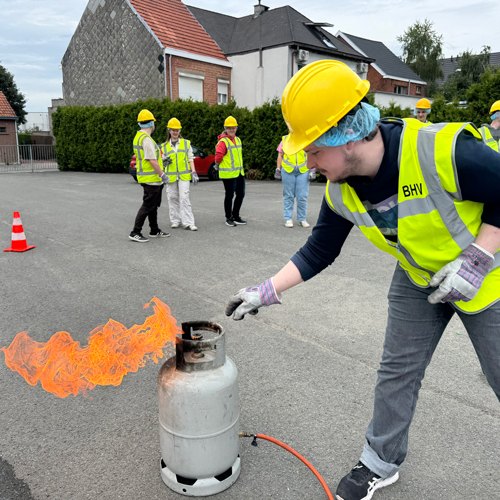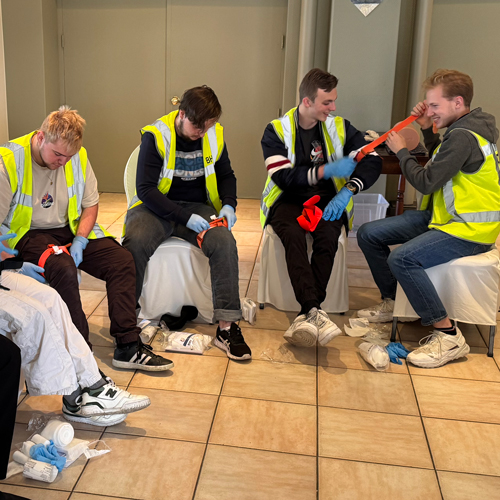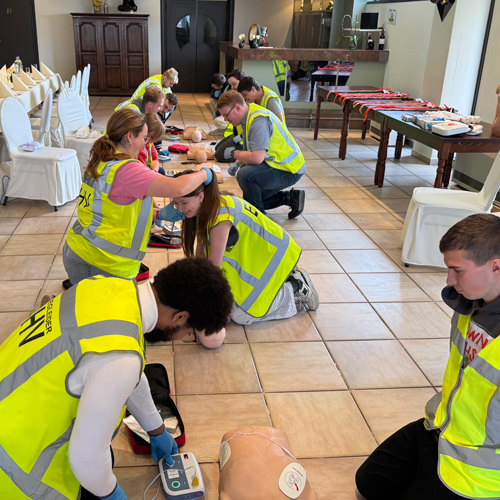
ERO Emergency Response Officer
Found! A professional ERO course to qualify as a company Emergency Response Officer (BHV).
Our ERO course for the Antwerp region provides everything you need to become a competent and skilled first responder in the emergency assistance chain.
In just one day, you will learn how to raise the alarm, provide basic first aid, perform resuscitation, extinguish an incipient fire, and carry out an evacuation.
Our course ensures that you acquire the essential skills and competencies to function as a company Emergency Response Officer, as outlined in the NedCert competence profile.


Here's what you will learn during your ERO course day
Experience a special day and step into another world, which can become reality on your own work floor.
You will learn about and work with various types of personal protective equipment essential for a first responder. This includes gloves, a safety vest, and a safety helmet, among others. We emphasise the importance of using this equipment correctly to protect yourself during an emergency situation.
You will receive training in basic first aid techniques, including life-saving measures such as wound treatment, recognising symptoms, and prioritising casualties. Additionally, you will learn how to use an automated external defibrillator (AED) effectively during resuscitation.
Here, you will learn how to use various materials and dressings from a trauma kit to control severe bleeding. This includes properly applying a tourniquet and using haemostatic dressings, among others. These skills are crucial in providing first aid for life-threatening bleeding. Following the example set by the United States, NedCert launched the national “Stop the Bleed” campaign in 2015 to raise awareness that immediate bleeding control can save lives.
You will learn about fire prevention and firefighting techniques, including understanding different fire classes and the proper use of fire extinguishers, such as water, carbon dioxide, foam and fire blankets. The goal is to familiarise yourself with effectively and safely extinguishing incipient fires.
Here, you will learn how to act quickly and effectively in the event of an accident to minimise further harm. This includes assessing the situation, taking appropriate precautions, and providing assistance to casualties until professional help arrives.
You will learn how to carry out a swift and organised evacuation in the event of an emergency. This includes understanding evacuation procedures, effectively alerting others, and guiding people to a safe location.
During this exercise, you will apply the evacuation methods you have learned in a realistic scenario. This allows you to test and, if necessary, improve your response skills.
You will learn how to communicate effectively during an emergency. This includes using communication devices such as phones and radios to transmit information quickly and clearly. Additionally, you will be taught how and when to contact the emergency services and what essential information to relay.
BHV / ERO renewal
Meet the professional who will guide you
I am Bas van Steenbergen, your NedCert-certified instructor.
With extensive experience in emergency care as a Certified Nurse, I understand firsthand how crucial it is to act swiftly and effectively in critical situations. This hands-on experience shapes my teaching approach.
My lessons are modern, to the point, and tailored to what you truly need. I use a varied mix of learning styles to keep you engaged and interested from start to finish.
By intentionally keeping groups small, I ensure that you receive the personal attention you deserve.
I will make sure you gain real-life experience in responding effectively to incidents in your workplace.


The ERO certificate is valid for two years
The examination is conducted by NedCert Certification in accordance with ISO 17024. Upon passing, the candidate receives an Emergency Response Officer (BHV) certificate, which is valid for two years.
Course fee
Frequently Asked Questions
NedCert is a well-known, internationally active Dutch certification body. Since 2004, it has been issuing certificates for professional competence in the fields of prevention, occupational emergency response, and emergency medical care.
The NedCert Stakeholder Board is responsible for the content of each certificate. This board consists of representatives from employers, employees (certificate holders), and training providers.
Upon successfully passing the exam, a certificate is issued to confirm the individual’s professional competence. This certification provides confidence that the holder can function effectively and efficiently in their respective field. All certificates are issued in accordance with ISO 17024.
BHV is mandatory for every employer and also for associations and event organizers.
This obligation can be found in the Working Conditions Act and the Regulations for fire-safe use and basic assistance for other places.
Yes, our BHV / ERO certificate is valid for 2 years!
This means that the Emergency Response Officer only has to attend an ERO day after 2 years.
Policy rules on working conditions legislation
These policy rules are expired. However, they are the last described most concrete guidance for the government. It roughly stated the following: every two years, at least 8 hours are spent per Emergency Response Officer on refresher courses and exercises.
How often the ERO must attend a course is NOT stated in the Working Conditions Act. Of course it is good to practice a few times every year, such as an evacuation drill, but that must be done at your company. You must, however, be able to demonstrate that you have competent ERO’s and that is possible with an official NedCert certificate.
The Emergency Response Officer provides assistance within companies and organisations.
According to Article 15 of the Working Conditions Act, a company with employees and / or visitors must have Emergency Response Officers. The emergency response officers must have followed training. If a company is still small, the owner may be the Emergency Response Officer himself.
It depends, among other things, on the size of the company and the risks that exist in a company, how many Emergency Response Officers there must be.
Click here for the NedCert online calculation tool to calculate the approximate number of Emergency Response Officers.

Read the reviews and experiences of fellow participants






